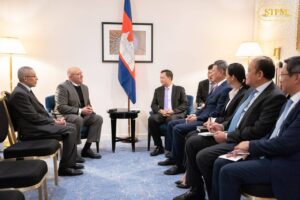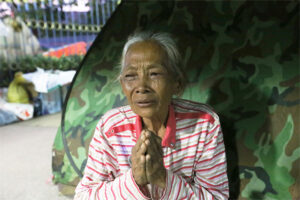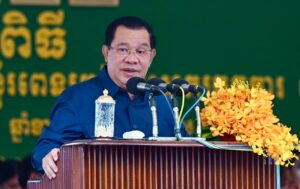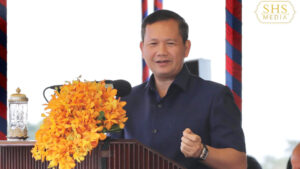[2]
(1) In absence of religion, people no longer think about sin or the boundaries of virtue and morality
The Khmer history is perhaps the most unique. There was a period of three years, eight months, and 20 days (under the Democratic Kampuchea,) in which religion was abolished. Some countries have had restriction on this or that religious freedom in order for another religion to flourish. In Cambodia, within the said period, every religion was abolished altogether. We observe what were the people’s actions in the absence of religions? (People) no longer think about merit or sinful action, or about the boundaries of virtue and morality. The virtuous are no longer virtuous. As long as someone caught with action deemed to have betrayed the organization, that someone became the target of attack. There is no understanding and compassion. Sometimes we overlook the value of something when it is (in existence) every day, like air […]
(2) Three international meetings bring participants from 40 countries to talk about peace and national unification
This week, we have three major international meetings. The CDI meeting of the centrist parties, with members from hundreds of countries around the world, has just ended in Siem Reap. In Phnom Penh, this morning, the ICAPP congress, with more than 60 political parties from 40 participating countries is wrapping up. Tomorrow, there will be another meeting of parliamentarians, organized by the National Assembly. They all are covering the topics about peace and national unification. Why these important meetings choose Cambodia (as a meeting place). All the participants wanted to learn factors that make finding peace in Cambodia successful and sustainable. Some countries have had episodes of stopping fighting for a while, and then starting fighting again. There was a truce, and then the retaliation followed, creating anger again, and sometimes between different ethnic groups in the same country, who follow different religions, and/or different sects […]
(3) Win-win politics is charity, understanding, tolerance, and non-punishment
I can say that the win-win politics is based on the Buddhist/religious teaching. The implementation of the win-win politics is in fact the practice of charity, understanding, tolerance, and non-punishment – all of which are based on the Buddhist teaching […] which has created trust that assures no revenge. I told HE the President of ICAPP and his deputy that “the key is trust. The three policies (set out by the government) are on paper. Without trust and practical implementation, those policies cannot be (implemented)” […] in some places, I told them, people discovered pits with hundreds of thousands of bullets and rifles buried in the forest. They could be for nothing else but a retaliatory action if their returns in 1998 to the nation was not what they were promised […] (those concerns, however, did not arise because we have shown them the national) truth and understanding […]
(4) DIFID aims to separate Khmer Rouge political leaders from lower-level leaders
Samdech Techo has said (this morning) that before (the extraordinary chambers in the court of Cambodia or) the Khmer Rouge Tribunal took shape, there had been some tough debates, until which Samdech Techo took a clear position that he said “I am willing for this court to fail but not for the country to fall into war again” […] Samdech Techo’s DIFID strategy initially was to separate the (Khmer Rouge) political leaders from their lower-level leaders because when the lower-level came in to the government, the war was over. If the soldiers came in and stopped fighting, no matter how the political leaders shouted, they would not fight. However, if the soldiers’ leaders still fought, even if the political leaders did not order (to fight), they would still do it […] that is why we determined that only political leaders should be tried. We consider those at the lower level to be victims as well because they were carrying out orders […]
(5) Understanding is the dharma that comes from the cultivation of Buddhism
The war (in Cambodia) started because of the military coup in 1970 and ended because the Khmer Rouge (army) joined the Royal Cambodian Armed Force. Why is this? It is because of trust and the implementation of the policy of tolerance under this win-win politics. Favoring, not retaliating, not arresting their ranks and files, the commanders of the army, giving and maintaining their positions, losing no benefits, and even initiating development projects, including demining, into the reintegrated areas for them. What should we call this? If we talk about sins, about understanding each other, this is the dharma (that comes from) our cultivation (of Buddhism) […] giving dharma, saving, and not taking punishment for the past […] is important. Samdech Techo favored many people, including those who wanted his life […]
(6) As countries become more advanced, religion plays more important role
You may ask if having a religious belief would not make you a scientist. No, that is not true. The same is true for Buddhism […] take for instance soft skill theory (instructed by some) […] is consistent with the Buddhist teachings about mutual respect, hard work, not being arrogant, and competing with integrity […] which means that the success in this modern era is based on dharma, on religion that has been compiled for thousands of years. Human society has not changed much from the beginning to the present, but of course the materials and means have. The foundations of human society, like religion, remain the same […]
[3]
(7) Tradition, culture, Buddhism and other religions can make a country modern and maintain its identity
Is there a contradiction between religion that has been compiled for thousands of years and science that is newly emerging and future-oriented? No, there is not. The important factor is knowing how to use it as a guide, a map to illuminate the path and define the boundaries of our journey. Would tradition, culture, Buddhism and other religions that have been compiled for thousands of years not bring us to become a modern country? It would. (Tradition, culture, Buddhism and other religions that have been compiled for thousands of years) can make us a modern country and maintain our identity. We are advancing and, in the globalization and modernization of society, making each generation more developed […]
(8) Without a restraining and guiding force, globalization can lead to the loss of national identity
Globalization can make the identity of each nation more and more blurred. Without a restraining and guiding force, from one generation to the next, it will become more and more exhausted. The question is, do people’s values and mindsets change? […] there are two different cultures. In one culture, people think that in order to be successful, one must have a house, a family, a salary, and so on. It focuses on the individual and the material things for life. In another culture, they don’t value those things alone. They value that you have all these things, but you must have a family that lives together well, happy, and doesn’t fight […] the country must progress and develop, but it must also preserve its national identity as Khmer […]
(9) The decline in social values and the drift away from culture and virtue is a danger that occurs in line with development
There are many influencers who do not need to do anything that goes against tradition and culture, and still maintain values […] they can still be influential and can still observe boundaries. This is cultural, moral and religious education that plays a role in helping (preserve national identity) […] the other day, there was a shocking story on Facebook about a beer promotion in which some young women were wearing shorts […] the company’s boss said he contracted a company of young people in their 20s or so to do advertisements. Those young people researched concepts from other countries, and forgot that bringing such content to Cambodia would infringe upon the local cultural boundaries […] this is a danger that occurs in line with development: the decline in social values and the drift away from culture and virtue from one generation to the next, if we do not (take action) […]
(10) Learning to gain knowledge but also to promote virtue and morality
(Social values) must be strengthened and promoted not only for the religious sector, but also for the national society to maintain identity. Development must be upheld, but it cannot be extending to the point where we lose all that identify us Khmer, while resorting to copying everything from others. In this regard, learning, constant care, is the determining factor for positive development […] learning knowledge is good, but we must also promote virtue and morality […] therefore, development and conservation go hand in hand. Conservation and education to introduce values (of culture) are important tasks that I think Buddhism, as well as other religions (can participate in). In all religions, none teaches people to kill each other, not to help each other. They all teach people to have respect, love, and help each other […]
(11) No matter how advanced we are, people are still human beings
Religion is like a theory of living in society, to have harmony, to help each other, to respect each other. Religious education is a theory of philosophy, linked to faith, to history, so that we can continue to live in society. Even though buildings are modernized, cars are no longer driven by people, we are still human beings, we still need to live and depend on each other. We still need to do good deeds and need others to do good in return, to help us and we help them. when we encounter difficulties […] we must adhere to the Dharma. This is the basis of unity. Without this (Dhamma that leads to unity), the culture of maintaining peace and stability will be broken and will be destroyed again […] (the National Convention of the Buddhist Monks in 2024) today, even though it is in the Buddhist sphere, it has made a significant contribution to strengthening the secular world, especially in maintaining our identity as Khmer […]
(12) Politics must be based on truth according to the path of Dharma
For more than a year and a half, the new Royal Government has been determined to continue to maintain peace, national sovereignty, and territorial integrity, with major national achievements and maintaining economic stability, as well as preventing and defeating a series of evil schemes, especially in the area of public security. Regarding integrity, those who know and still lie, is it a sin? […] some politicians lie to scare the people, even though they know about the CLV-DTA, still. Last night, there was this Funan Techo canal thing, where they lie to the people that the state has not got money to build it […] we broke ground on August 5 […] and some people cried out loud that their houses were demolished […] that we haven’t dug a spade yet, they said we ran out of money […] that people, who lack information, are worried, I could understand it […] whereas some politicians, who know clearly the issue, still scare the people. Don’t you know that intentionally lying to make people worry and break solidarity is a sin? […] Politics must be based on truth according to the path of Dharma […] politics must be done with integrity […]
(13) Practice religion with integrity, maintain security and order, and the feelings of the people and society
His Excellency the Chinese Ambassador here. They say that China does not give financial support to (the Funan Techo canal) […] I will help explain this matter so that the people can calm down a bit, and so that those liars are reprieved to a certain extent from their serious sins. I have been in a monkhood for 7 days […] I have learnt that there is no dharma that talks about cursing. However, some monks abroad, I have seen, who, wear the Buddhist robes, are cursing more severely than the common people. They curse […] it is my understanding that creating stories to bring false information to the common people, the Buddhist followers, intentionally causing them to have doubts and misunderstandings is inappropriate. The practice of religion includes speaking with integrity, helping to maintain security, order, and the feelings in the hearts of the people and society […]
[4]
(14) Expanding new things, protecting what is there, protecting values, and protecting religious beliefs
I have linked the important role of Buddhist monks to educating society and educating youth. Monks play the role of teachers and role models in this technological age. Every activity is easy to share and to see. Seeing pictures of monks fighting each other somewhere […] actions and activities of each monk can have a huge impact on tens of thousands of monks in the country, as well as the religious sector as a whole […] we are not only expanding new things, but also protecting what we already have, protecting values, and protecting religious beliefs. Expansion is good, but the bigger it grows, the more difficult it is to control. The more people, the more difficult it is. We must increase training, education, and internal discipline management to help the entire religion […]./.






